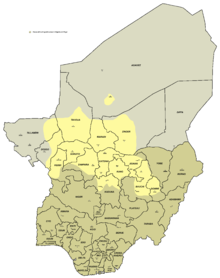Hausa (language)
| Hausa | |
|---|---|
| Harshen Hausa هَرْشَن هَوْسَ | |
| Native to | Niger, Nigeria, Ghana, Benin, Cameroon, Ivory Coast, Togo and Libya. |
| Region | Eastern Sahel as a language of trade |
|
Native speakers
|
70 million in Nigeria (2016) 50 million as a second language in Nigeria (2016); millions more elsewhere |
|
Latin (Boko alphabet) Arabic (ajami) Hausa Braille |
|
| Official status | |
|
Official language in
|
|
| Language codes | |
| ISO 639-1 | ha |
| ISO 639-2 | |
| ISO 639-3 | |
| Glottolog | haus1257 |
| Linguasphere | 19-HAA-b |

Areas of Niger and Nigeria where Hausa is spoken
|
|
Hausa (/ˈhaʊsə/) (Yaren Hausa or Harshen Hausa) is the Chadic language (a branch of the Afroasiatic language family) with the largest number of speakers, spoken as a first language by about 35 million people, and as a second language by millions more in Nigeria, and millions more in other countries, for a total of at least 41 million speakers. Originally the language of the Hausa people stretching across southern Niger and northern Nigeria, it has developed into a lingua franca across much of western Africa for purposes of trade. In the 20th and 21st centuries, it has become more commonly published in print and online.
Hausa belongs to the West Chadic languages subgroup of the Chadic languages group, which in turn is part of the Afroasiatic language family.
Native speakers of Hausa, the Hausa people, are mostly found in Niger, in the north of Nigeria, and in Chad. Furthermore, the language is used as a trade language across a much larger swathe of West Africa (Benin, Ghana, Cameroon, Togo, Ivory Coast etc.), Central Africa (Chad, Central African Republic, Gabon) and in northwestern Sudan, particularly amongst Muslims.
...
Wikipedia
